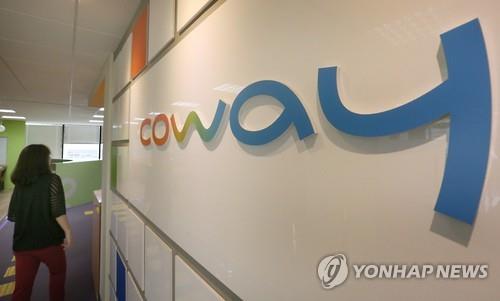- California Assembly OKs highest minimum wage in nation
- S. Korea unveils first graphic cigarette warnings
- US joins with South Korea, Japan in bid to deter North Korea
- LPGA golfer Chun In-gee finally back in action
- S. Korea won’t be top seed in final World Cup qualification round
- US men’s soccer misses 2nd straight Olympics
- US back on track in qualifying with 4-0 win over Guatemala
- High-intensity workout injuries spawn cottage industry
- CDC expands range of Zika mosquitoes into parts of Northeast
- Who knew? ‘The Walking Dead’ is helping families connect
Coway faces another suit over faulty water purifiers
SEOUL, Aug. 19 (Yonhap) — A group of local consumers was to file a 2.8 billion won (US$2.53 million) class action suit Friday against Coway, South Korea’s leading water purifier maker, over its water purifier models coated with nickel that they claim taints the water and poses a health hazard.
Nickel from the inner coating was found in dispensed water from three ice maker-water models installed from April 2014 to December 2015 by Coway, with the number of users involved estimated at about 87,000. Coway has vowed to take responsibility should any health problems be confirmed from using the company’s products.
The 1,126 Coway purifier users claim Coway was aware of the defect for over a year but tried to cover it up, demanding the company pay each user 1.5 million won for a medical checkup and 1 million won in compensation for emotional distress.
Another group of 160 consumers filed a lawsuit against Coway three weeks ago, seeking 1.6 billion in damages.
The users argue there is a high possibility that Coway may have not disclosed the fact out of concern over its impact on share prices, though it had discovered nickel was present in the drinking water in July 2015.
At the time, private-equity firm MBK Partners, its largest shareholder, was pushing for the sale of its stake in the company.
The consumers claim the intake of a small amount of nickel for an extended period of time is harmful to humans. It is widely known that breathing nickel dust can lead to lung cancer, but few studies have been conducted on the impact of the oral intake of the metal.
Users of Coway’s ice maker-water purifier models plan to hold a protest rally in front of the company’s head office in downtown Seoul to demand the cancellation of all rental contracts without penalty fees, disciplinary action against those responsible and a thorough government survey.
The government had planned to unveil the outcome of its probe into the case Friday but decided to announce it later this month, citing the need for a supplementary study into harmful effects on the body.
The case comes amid a seething public scare over toxic humidifier sterilizers sold by British firm Oxy Reckitt Benckiser, which have claimed more than 100 lives.












